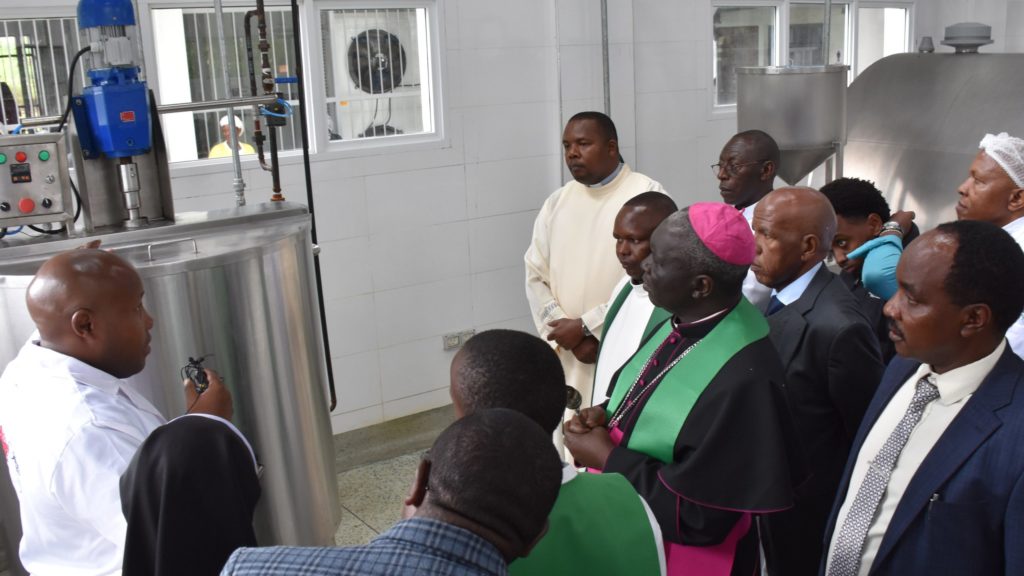Against growing concerns about millions of people going hungry worldwide, the Archdiocese of Nairobi launched a milk processing plant Nov. 16 to help local communities in central Kenya fight food insecurity and malnutrition.
At the launch, Archbishop Philip Subira Anyolo of Nairobi said that the Caritas dairy project stood as a beacon of hope and solidarity, in a world where millions suffered a shortage of sufficient, safe and nutritious food.
"It embodies our commitment to alleviating hunger, nurturing sustainable livelihoods, and uplifting the lives of our brothers and sisters," the prelate said at the launch in Limuru, a lush green area about 19 miles northwest of the capital, Nairobi.
Named Caritas Dairy, the milk processing plant is the project of Caritas Nairobi. The factory will buy and sell milk produce from thousands of farmers, in an effort to empower their work and bolster the communities' food availability.
Archbishop Anyolo said the dairy project was not a mere venture.
"It is a testament to our unwavering dedication to serve humanity. It reflects our belief that every individual deserves access to nutritious food, every farmer deserves a fair opportunity to thrive, and every community deserves the chance to flourish," he said.
According to the archbishop, this was part of the archdiocese's active work with the farmers, in which it encouraged those with land to cultivate and produce enough food to sustain the families, as part of the church's mandate to feed the hungry.
The work was inspired by Pope Francis' call for a more inclusive and sustainable food system, which supports farmers in producing and improving their capacities and resilience, said the archbishop. It also falls under the U.N.'s Sustainable Development Goal number two: to "End hunger, achieve food security and improve nutrition and promote sustainable agriculture."
"We will continue to work with our farmers to grow their dairy unit, we will put more efforts to collect more milk from the farmers, enhance the capacity of our processing unit as well as look for a friendly market for our farmers' milk," said the archbishop.
Caritas Nairobi started the construction of the factory in 2020, launched trials in October 2022 and went into full production two months later, according to James Kiiru, the Caritas Dairy board chairman.
"Just a few years ago, the concept of Caritas Dairy was just a dream, a glimmer of hope in the minds of those seeking to transform the dairy industry in Kenya. From a very humble start, where on day one we collected a total of only 46 liters (12 gallons) of milk, the road ahead seemed daunting, filled with uncertainties and obstacles," said Kiiru.
"Presently, our optimism is high as we procure from a network exceeding 2,000 farmers," Kiiru said. "This remarkable expansion mirrors the commitment and diligent efforts of a lot of men and women working at the Dairy."
At the event, Sister Mary Mbaci, the director of Caritas Nairobi recalled how, 13 years ago, the agency initiated a heifer exchange program to promote livelihoods, community cohesion and care for the poor, within three communities in Kiambu County.
"From the three communities, the heifer exchange program benefited 113 farmers who became committed dairy farmers," said Sister Mary, adding that the three farmers' groups embraced the program and laid the foundation for a farmers' network, known today as Faidi.
The factory is benefitting Faidi's current dairy farmer membership of 4,000. It has also created jobs for a number of people in the chain, led to breeding upgrades and linked the farmers to savings and credit services, among other benefits.
"Today, we are able to collect the milk from our farmers, process it and take it to market," said the sister.
Several church organizations, including the Italian and Irish Caritas, as well as Catholic Relief Services, the overseas relief and development agency of the U.S. Catholic community, among others, collaborated with Caritas Nairobi in the project.
Archbishop Anyolo hoped the Caritas Dairy would become a symbol of hope, a catalyst of progress, and a testament to the transformative power of unity and compassion.

